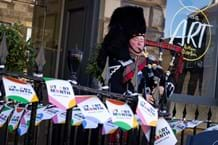IT was a case of sweet and sour as two headline-grabbing London auctions came to an end before a bid could be raised last week.
It meant that buyers never had the chance to compete for these unique items, but in both cases, heritage and history was the benefactor.
On Monday, March 27, Bjorn Borg reversed his decision to sell his Wimbledon trophies in the summer – he had been overcome by the strength of the public outcry at such a disposal. Then the following day, the newly-discovered Hooke manuscript was the subject of a private treaty sale moments before it was scheduled to sell in Bond Street.
Bonhams, who had achieved widespread publicity, creating huge interest in the two sales, published a statement from Borg on his withdrawal of the trophies and racquets associated with his five consecutive Wimbledon titles (1976-80).
“Never did I expect the symbolism of these trophies to be of such amazing magnitude,” he confessed. “I now realise how closely connected they are to my success as a Wimbledon winner in 1976-80 and this revelation has caused me to reconsider my earlier intention to sell them. After great consideration and reasoning, I have decided that I will never sell – and have withdrawn them from sale.”
And the auction house was at hand as the private treaty sale of the 520-page minute book, compiled by Robert Hooke during his years as Secretary to the Royal Society, was finally negotiated at the eleventh hour. It had been found in a Hampshire cupboard and was expected to sell for something in excess of £1m on March 28.
Calls had come from the scientific world for a benefactor to save this “lost” record of events in a crucial period in the history of scientific advance for the nation. Meanwhile the Royal Society launched a two-pronged attack: a fundraising campaign coupled by a legal team to investigate their claim to own the manuscript.
While Bonhams could provide a provenance from the vendor back to 1715, the Royal Society took what they called “a precautionary measure” to investigate the possibility that the minutes had been removed unlawfully from its archives.
Physicist, chemist, cosmologist, biologist, horologist and mechanic, Hooke was curator of experiments and, from 1677, the society’s secretary. Rather than the official, published minutes, these are his personal notes of meetings and discussions that took place from 1677-82, together with an extensive transcript of events of earlier years.
However, as the sale date approached, the RS became satisfied that the best chance they had of stopping the sale of the manuscript was to strike a pre-sale deal. Julian Radcliffe of the Art Loss Register was a key figure in the negotiating team: their offer, close to the low estimate of £1m, was accepted just moments before lot 189 was due to be sold.
In a brief statement, Robert Brooks, the chairman of Bonhams, took to the rostrum to announce: “A private treaty sale has been concluded with the Royal Society for the Hooke manuscript and so this lot has been withdrawn from sale.”
Royal Society press officer Robert Ward told ATG the funds were in place to acquire the manuscript thanks to 146 donations or pledges ranging from £5 to £500,000, of which 122 had been made by fellows of the Royal Society.
Lord Rees of Ludlow, the president of the RS, said: “This is great news for science and great news for Britain. Robert Hooke was a colossal figure in the founding of modern science, and these documents represent an irreplaceable record of his contribution. They provide an insight into one of the great minds of early modern science. It is marvellous that these documents are returning home ahead of the Society’s 350th anniversary in 2010.”
By ROLAND ARKELL
Borg and Hooke raise a wry smile in Bond Street
IT was a case of sweet and sour as two headline-grabbing London auctions came to an end before a bid could be raised last week.




